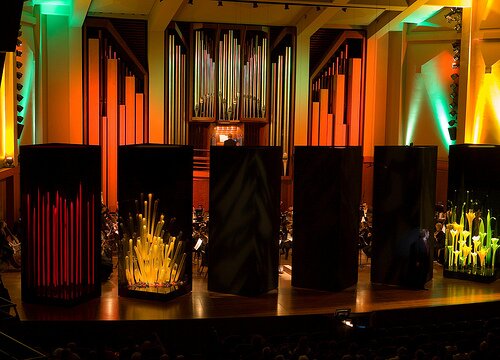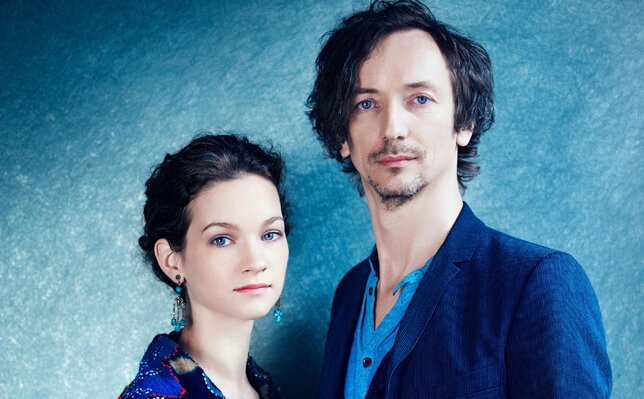
This week, six displays of vividly colored glass grace the stage at Benaroya Hall. Created by local luminary Dale Chihuly, these sculptures serve as the set for Béla Bartók’s opera Bluebeard’s Castle. Chihuly collaborated with the Seattle Symphony in 2007 to develop the set for this production.
Since then, the glass has traveled around the world for stagings of Bluebeard’s Castle, accompanied by their own special stage crew. Now the sculptures have returned home for two Seattle Symphony performances this week — one on Tuesday night, another tonight. It’s a veritable feast for both the eyes and ears that’s not to be missed.
Unlike performances in most opera houses, Seattle Symphony’s production uses concert staging, meaning that the orchestra sits on stage with the singers. Typically, this format doesn’t leave much room on stage for a set. However, the ingenious stage layout for Bluebeard’s Castle accommodates the entire Seattle Symphony and six enormous displays of Chihuly glass sculptures while still leaving space for the two vocal soloists to move around.

Bluebeard’s Castle is based on a folk legend about the mysterious nobleman Bluebeard and his new bride, Judith. The tale begins as the newlyweds arrive at Bluebeard’s gloomy, dank castle. There Judith discovers seven locked doors and demands to see what is behind them. As the doors are opened one by one and Bluebeard’s dark secrets are revealed, Judith discovers that there is much more to her new husband than meets the eye.
This psychological thriller of an opera is a challenge to produce. Unlike the large casts of most operas, Bluebeard’s Castle features only two characters, Bluebeard and Judith. Despite the fact that it only takes an hour to perform, the one-act opera places great demands on vocalists, who must be onstage and singing for the entire hour.
Like many of Bartók’s other works, Bluebeard’s Castle contains melodies, harmonies, and rhythms from Hungarian folk tunes, adding a unique flavor to the opera. Since there are only two vocal parts, the score relies heavily on the orchestra to set the mood, develop the characters, and communicate emotional and psychological drama.
Although the opera is sparse on action, especially in the limited space of a concert staging, Tuesday’s performance was intense and enthralling. Under the baton of maestro Gerard Schwarz, the orchestra blended well with the vocalists, underscoring the characters’ complex emotions and painting a vivid musical picture of the castle’s secrets.
Bass-baritone Charles Robert Austin brought complexity and emotion to the role of Bluebeard, emphasizing the character’s humanity rather than portraying him as simply a monstrous villain. Austin has sung this part in performances around the country and seemed very comfortable in the role. His understated yet effective acting felt very appropriate for the limited space of the concert staging format.

As Judith, mezzo-soprano Nancy Maultsby emphasized the character’s conflicting emotions. Initially timid and nervous, Judith eventually shows a stubborn streak, proclaiming her love for Bluebeard no matter the cost and demanding to discover the secrets locked away behind the castle’s mysterious doors. Though convincing, Maultsby’s acting seemed constrained by her use of the score throughout the performance, which prevented her from straying too far from the music stand at the center of the stage.
Chihuly’s sculptures provided a exciting visual element to the performance. Like presents at Christmas, the sculptures are revealed one by one throughout the opera, adding a sense of anticipation. Illuminated by spotlights in the dark auditorium, the glass seemed to glow from within. Chihuly’s stage crew deserves praise for a seamless performance, creeping around the stage to rotate each display at exactly the right moment in the operatic action.
Preceding the opera was the world premiere of Michael Hersch’s along the ravines, featuring piano soloist Shai Wosner. Based on poetry by Zbigniew Herbert, this piece for piano and orchestra paired well with Bluebeard’s Castle, sharing the opera’s emotional intensity and overwhelming sense of foreboding. Tonight’s concert features a different world premiere. Soprano Jennifer Zetlan joins the Symphony for six concert arias from David Diamond’s opera The Noblest Game.



